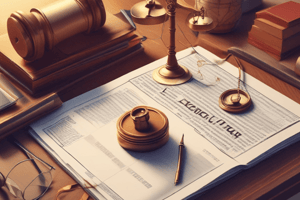Podcast
Questions and Answers
What is litigation?
What is litigation?
Judicial proceedings or contest in law
Which party brings an action before a court in litigation?
Which party brings an action before a court in litigation?
Plaintiff
Which of the following is NOT a type of relief in litigation?
Which of the following is NOT a type of relief in litigation?
- Money award
- Injunction
- Stock option (correct)
- Enforce a right
Litigants are required to use a lawyer.
Litigants are required to use a lawyer.
What organization typically licenses attorneys?
What organization typically licenses attorneys?
What is a common requirement for practicing law?
What is a common requirement for practicing law?
What role does a lawyer play in preparing a case?
What role does a lawyer play in preparing a case?
Match the following factors in deciding to sue with their descriptions:
Match the following factors in deciding to sue with their descriptions:
Judges are always biased and cannot provide fair outcomes.
Judges are always biased and cannot provide fair outcomes.
What dictates the timing and progression of a lawsuit?
What dictates the timing and progression of a lawsuit?
What is the primary function of trial courts?
What is the primary function of trial courts?
What must an appellant prove in an appeal?
What must an appellant prove in an appeal?
Which of the following is NOT a remedy on appeal?
Which of the following is NOT a remedy on appeal?
What does jurisdiction refer to in a legal context?
What does jurisdiction refer to in a legal context?
What is required for personal jurisdiction over a defendant?
What is required for personal jurisdiction over a defendant?
Flashcards are hidden until you start studying
Study Notes
Overview of Litigation
- Litigation refers to judicial proceedings where disputes between individuals are resolved through the court system.
- The process involves a plaintiff bringing an action against a defendant to seek a legal remedy, which can include enforcement of rights, monetary awards, or injunctions.
Self-Representation in Litigation
- Litigants can generally represent themselves but the importance of legal advocacy is emphasized.
- An adversary system creates a structured opposition in legal contests, highlighting the complexity of presenting a case without legal expertise.
Legal Practice and Requirements
- To practice law, individuals must typically be licensed by a Bar Association, which sets standards and regulations.
- Common practice requirements include demonstrating good moral character, meeting educational standards, passing examinations, and adhering to ethical guidelines.
Responsibilities of Lawyers
- Lawyers provide legal advice, prepare various legal documents, and represent clients in government matters.
- They are involved in negotiations to settle disputes and handle representation in court for both civil and criminal cases.
Considerations for Filing a Lawsuit
- Factors influencing the decision to sue include costs (filing and legal fees), potential loss of time, and stress.
- Long-term effects on relationships and the uncertainty of the lawsuit's outcome are also critical considerations.
Court Procedures and Rules
- Civil Procedure governs lawsuits, detailing timing and progression of legal actions, with non-compliance potentially resulting in dismissal.
- Courts are categorized as trial courts or appellate courts, each serving distinct functions in the judicial process.
Functions of Trial Courts
- Trial courts focus on fact-finding, applying relevant laws, and determining the outcome of disputes based on the combination of law and facts.
Role of Appellate Courts
- Appellate courts review decisions made by lower courts, allowing for appeals that challenge previous judgments.
- Appeals must commence with filing a notice, which typically includes an Appellate Brief.
Appeal Considerations
- Appeals are based on the trial record and may sometimes include new evidence.
- The appellant must demonstrate that the lower court made an error in its decision-making.
Possible Outcomes on Appeal
- Appeals may result in affirming the lower court's ruling, reversing it, or remanding the case back for further proceedings.
Understanding Jurisdiction
- Jurisdiction refers to a court's authority to hear a case, determined by procedural rules and laws establishing the court's power.
- Proper jurisdiction must be established for a court's judgment to be valid; issues of personal, subject matter, and in rem jurisdiction are common.
Personal Jurisdiction
- Personal jurisdiction requires that the defendant is physically present in the court's geographic area at the time the lawsuit is initiated.
- Due process mandates fair notice and the opportunity for the defendant to defend against the lawsuit.
Subject Matter Jurisdiction
- Subject matter jurisdiction defines the type of cases a court can address, with specific courts designated for particular claims (e.g., small claims, bankruptcy, domestic relations, intellectual property).
Studying That Suits You
Use AI to generate personalized quizzes and flashcards to suit your learning preferences.




